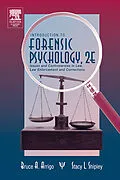Introduction to Forensic Psychology, Second Edition is an original approach to understanding how psychologists impact the research, practice, and policy of crime, law, and justice. Divided into four sections on criminal forensics, civil forensics, policing and law enforcement, and corrections and prison practices, the text examines police, court, and correctional aspects of forensic psychology. Each of the twelve chapters are organized around relevant case illustrations, include comprehensive literature reviews, and discuss policy implications and avenues of future research. Each chapter additionally incorporates research on race, gender, and class, as well as including a practice update, highlighting a timely issue or controversy.The text thoughtfully explores a wide range of adult, juvenile, family, and community themes of interest to students, practitioners, and administrators. New to the Second Edition is a chapter on international criminal forensic psychology, and sections on assessing psychiatric work-related disability, termination of parental rights, counseling prison populations, malingering, crisis intervention in prisons/jails, and child custody evaluations. Suitable as a primary text for courses on psychology and criminal justice, the book may also serve as a reference tool for practicing forensic psychologists. - Provides an integrative approach provides a more comprehensive understanding of the relevant material - Focus on police, court and corrections introduces students to how psychologists are important to the criminal justice system - Presents "cutting edge" issues that prepares students to interpret those issues at the forefront of the field - Presents a breadth of material accessible to students from which they can consider more intelligently their own career options - Case illustrations throughout points to the practical need to understand the material - Incorporates over 35% new material
Autorentext
Bruce A. Arrigo, Ph.D., is Professor of Criminology, Law, and Society at the University of North Carolina - Charlotte. He holds additional faculty appointments in Psychology, in Public Policy, and in Public Health Sciences. Dr. Arrigo has (co)authored or (co)edited) 30+ books and 175+ scholarly papers in the areas of justice and social welfare at the intersection of law, mental health, and society. He also is the founding and current editor-in-chief of the Journal of Forensic Psychology Practice, a Fellow of both the American Psychological Association and the Academy of Criminal Justice Sciences, and has served as a consultant to the Correctional Service of Canada, the National Institute of Justice, the National Science Foundation, and Savant Learning Systems.
Klappentext
Introduction to Forensic Psychology, Second Edition is an original approach to understanding how psychologists impact the research, practice, and policy of crime, law, and justice. Divided into four sections on criminal forensics, civil forensics, policing and law enforcement, and corrections and prison practices, the text examines police, court, and correctional aspects of forensic psychology. Each of the twelve chapters are organized around relevant case illustrations, include comprehensive literature reviews, and discuss policy implications and avenues of future research. Each chapter additionally incorporates research on race, gender, and class, as well as including a practice update, highlighting a timely issue or controversy.
The text thoughtfully explores a wide range of adult, juvenile, family, and community themes of interest to students, practitioners, and administrators. New to the Second Edition is a chapter on international criminal forensic psychology, and sections on assessing psychiatric work-related disability, termination of parental rights, counseling prison populations, malingering, crisis intervention in prisons/jails, and child custody evaluations. Suitable as a primary text for courses on psychology and criminal justice, the book may also serve as a reference tool for practicing forensic psychologists.
*Provides an integrative approach provides a more comprehensive understanding of the relevant material
* Focus on police, court and corrections introduces students to how psychologists are important to the criminal justice system
* Presents "cutting edge" issues that prepares students to interpret those issues at the forefront of the field
* Presents a breadth of material accessible to students from which they can consider more intelligently their own career options
* Case illustrations throughout points to the practical need to understand the material
* Incorporates over 35% new material
Inhalt
Part I: Court and the Legal Systems: Criminal Forensics.
Adult Forensics.
Juvenile/Family Forensics.
International Criminal Forensics.
Adult Forensics.
PART II: Court and Legal System: Civil Forensics.
Adult Forensics.
Juvenile Forensics.
Family Forensics.
PART III: Police and Law Enforcement.
Adult Issues in Policing/Psychology.
Juvenile Issues in Policing/Psychology.
Family/Community Issues in Policing/Psychology.
Part IV: Corrections and Prison Practices.
Adult Issues in Corrections/Correctional Psychology.
Juvenile Issues in Corrections/Correctional Psychology.
Family/Community Issues in Corrections/Correctional Psychology.
